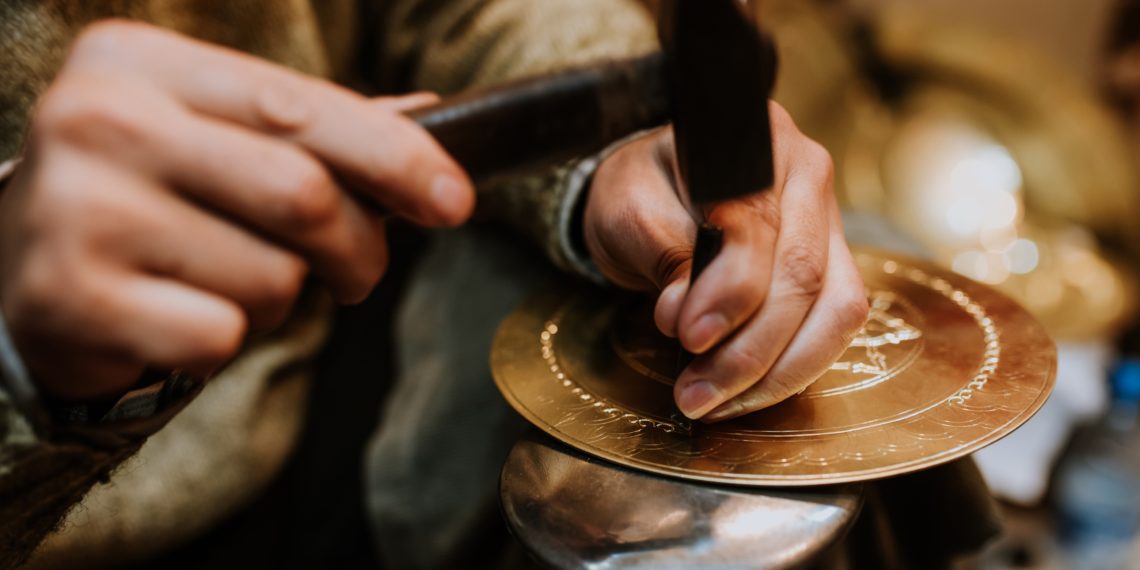Morocco is a nation with a lively culture and a long history, which is reflected in the wide variety of handicrafts produced there. Moroccan traditional crafts are popular both domestically and abroad, and range from elaborate carpets and colorful pottery to exquisite leather products.
One of the most well-known Moroccan handicrafts is probably carpets, and the nation has a long history of making exquisite, hand-woven rugs. Moroccan carpets are famous for their intricate patterns and vivid colors, and they’re frequently created out of wool and natural dyes. A process known as “knotted pile” is used to create many Moroccan carpets, in which the wool is knotted onto the warp threads to produce a raised design. These carpets are frequently created by talented artisans who take great pride in their work and who have learned their trade from their families.
Another significant Moroccan craft is leather, and the nation is renowned for creating high-quality leather accessories including belts, shoes, and bags. Moroccan leather artisans are renowned for their focus on detail and their capacity to produce exquisitely crafted items that are both practical and fashionable. Many leather products created in Morocco are handcrafted utilizing age-old methods like hand sewing and hand tooling, and they are frequently decorated with elaborate patterns and designs.
Another well-liked Moroccan specialty is pottery, and the nation is the home of many distinctive pottery-making methods. Moroccan pottery is famous for its vivid hues and elaborate patterns, and it’s frequently used to make decorative objects like bowls and vases. Moroccan pottery is frequently finished with a glossy glaze and is typically created by combining hand-throwing and hand-molding processes.
Metalwork: Moroccan metalwork is also highly prized, visitors to the nation do in fact prize and seek out Moroccan metalwork. Moroccan-only traditional methods have been passed down from generation to generation and are utilized to make these metal artifacts. Some of the most popular alternatives for people wishing to add a bit of Morocco to their house are Moroccan lamps, lanterns, and candleholders. These products frequently have detailed patterns and designs that are hand-hammered and can range from straightforward geometric shapes to more complex organic designs.
Moroccan ceramics and tiles are incredibly beautiful and highly valued for their artistry. They are frequently handcrafted using age-old methods that have been passed down from one generation to the next, and the finished goods are genuine works of art. The city of Fez, where the ancient ceramic industry has been thriving for centuries, is home to some of the most renowned pottery and tile work in all of Morocco. The numerous workshops and industries in Fez are open to tourists who want to view the artisans at work and buy their goods. Moroccan ceramics and tiles are an exquisite way to add a touch of Morocco to your life, whether they are utilized for functional purposes or as aesthetic pieces in a home or garden. They are a distinctive and classic way to decorate your house or place of business. They also make wonderful gifts and keepsakes.
In addition to these crafts, Morocco is the birthplace of a variety of other traditional handicrafts, such as textiles, metallurgy, and woodworking. Moroccan metalworkers are talented at producing a variety of metal objects, from jewelry to household items, while Moroccan woodworkers are renowned for their ability to produce exquisitely made furniture and ornamental pieces. Moroccan textiles are also highly valued and frequently utilized to make a variety of beautiful and practical things, such as embroidered fabrics and traditional clothes.
In general, Moroccan handicrafts have a significant role in both the culture and economy of the nation. These crafts are essential to Moroccan culture and are frequently passed down from one generation to the next. There is something for everyone to enjoy in Morocco’s thriving and diverse handicraft arts scene, whether you want to buy a lovely Moroccan carpet or try your hand at producing ceramics.





